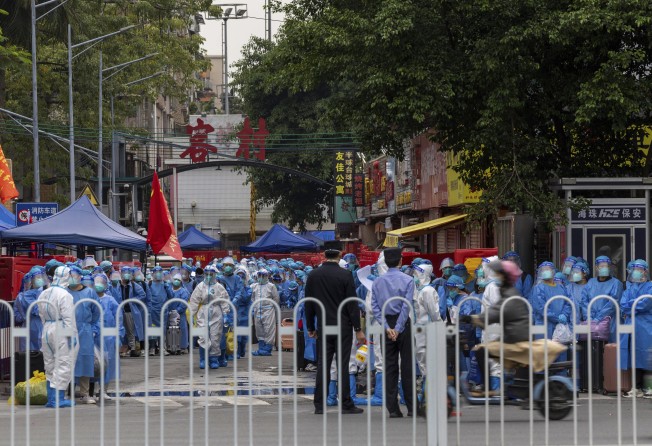
05:11
Nearly 3 years of Covid curbs take their toll on China’s middle class with many seeking counselling

Several days ago, Tengfeng, a clothing distributor who lives in the southern Chinese city of Guangzhou, woke up to find the nearby urban village of Kangle sealed off because of a Covid-19 outbreak. No one was allowed in without a negative PCR test result within 24 hours.
“It’s best not to enter the village [to avoid a yellow health code],” he said. “But I had goods to deliver.”
Kangle is part of a textile compound within the larger district of Haizhu in Guangzhou. The compound is home to 59 wholesale textile markets and 23,000 shops that employ tens of thousands of workers directly as well as another 2 million people in related industries.
Now, Tengfeng who refused to give his family name is in lockdown, along with about 100,000 other workers.
Guangzhou has seen a surge in cases this month with 2,367 infections reported on Wednesday. Last Friday, authorities rushed to expand the lockdown, sealing off all of Haizhu district, the epicentre of the Guangzhou outbreak. But the restrictions have come at a particularly difficult time: China’s largest online shopping festival – known as Double 11 – starts on Friday.
Still, small businesses have been scrambling to meet production goals to guarantee supplies for the festival despite the restrictions, as they test the effectiveness of the controls.
Around October 23, before the lockdown had been expanded, some business owners managed to smuggle their goods out, Tengfeng said. “For example, buying cigarettes for the security guard in return for ‘a favour’, or giving red envelopes [with money] to some senior management officials to let them pass directly.”
For a few nights, trucks, minivans and electric bicycles jammed into the area’s narrow alleys, which were then loaded with cloth and shuttled out to multiple distributors, residents and community workers confirmed.
“There are still individual residents who violate the prevention and control regulations, move fences to go outside without permission, or pass packages to one another,” said Zhang Yi, deputy director of the Guangzhou health commission, who called out the illegal activities on Sunday, adding the city was facing its “most complex and severe” control challenge of the entire pandemic.
On Saturday, a government notice warned that from November 5-7 – the three days that had originally been planned for the lockdown in Haizhu – shops that opened illegally would be fined 10,000 yuan (US$1,390), factories distributing goods would be fined 50,000 yuan, and logistics companies would face fines of 100,000 yuan. Health authorities have since extended the district lockdown to Friday.
The tighter containment measures have forced a total shutdown of the local textile compound, and also hit downstream garment factories and trading companies.
Tengfeng, who was already struggling for new orders, said he lost about one-third of his total annual orders due to the current lockdown.
“But it’s still within an acceptable range,” he said. Working from home, he said he is now securing orders on the social media platform WeChat, and is relying on factories elsewhere, such as Foshan and Zhongshan.
Chen Shaoyuan, a manager at Yuanfa Jeans Company, which is located in the same textile compound, said the epidemic restrictions have had a huge impact. “Now there’s no business at all,” he said. “We’ve been closed for many days.”
The ripple effects have stretched as far as central Hubei province. One owner of a small garment factory in Hubei recently returned from Guangzhou to find an outbreak had forced his factory to shut down, with both supply and demand sides impacted.
The owner, who requested anonymity, said that raw materials cannot be sent from Guangzhou and finished products cannot be delivered from Hubei.
But enforcement of the lockdown in Haizhu district is complex. The urban villages within the district are densely populated with as many as 200,000 residents, and they are highly mobile.
“It takes at least two hours to circle the district, and I’ve come to the village 100 times, but I still get lost almost every time,” a local government worker said.
The area is also dotted with unregulated construction and many residential buildings that are situated close together, making enforcement of pandemic restrictions extremely difficult.
“The ventilation is bad. Many people live in very poor quality places, many without windows. The virus could spread very quickly in such conditions,” he said
A landlord who manages five buildings under lease in one urban village called the place “hell”.
“I dare not go back myself. It’s totally a mess,” he said. Healthcare volunteers are also reluctant to enter the area because of the highly contagious virus. Some have even refused daily pay of up to 1,000 yuan from local authorities.
In the first two weeks of the outbreak, local residents, mostly textile workers, were slow to comply with the pandemic control measures, partly due to the chaotic management on the ground, and partly due to the poor living conditions for home quarantine, the government worker said.
He said he had spent a week helping to transport Covid-positive patients to the hospital and their close contacts to quarantine hotels.
“Now everything is generally in order,” he said, adding some people are even glad to quarantine in hotels, which are much better equipped than their tiny homes.